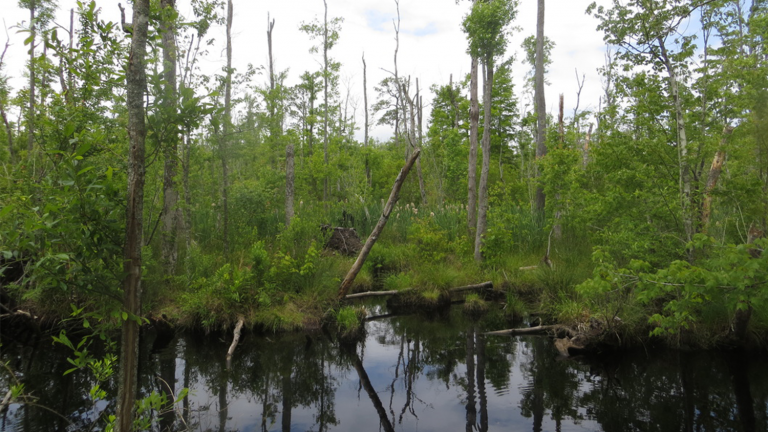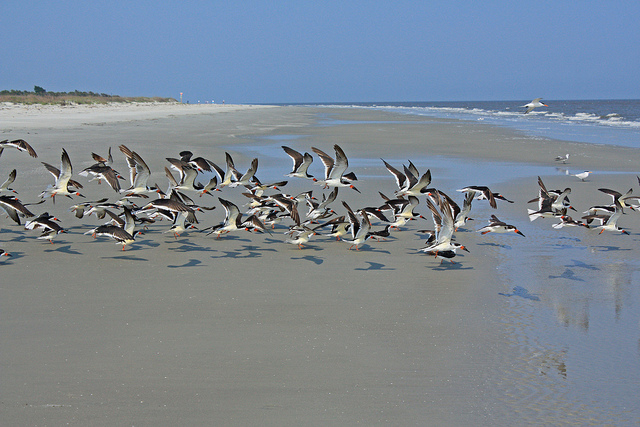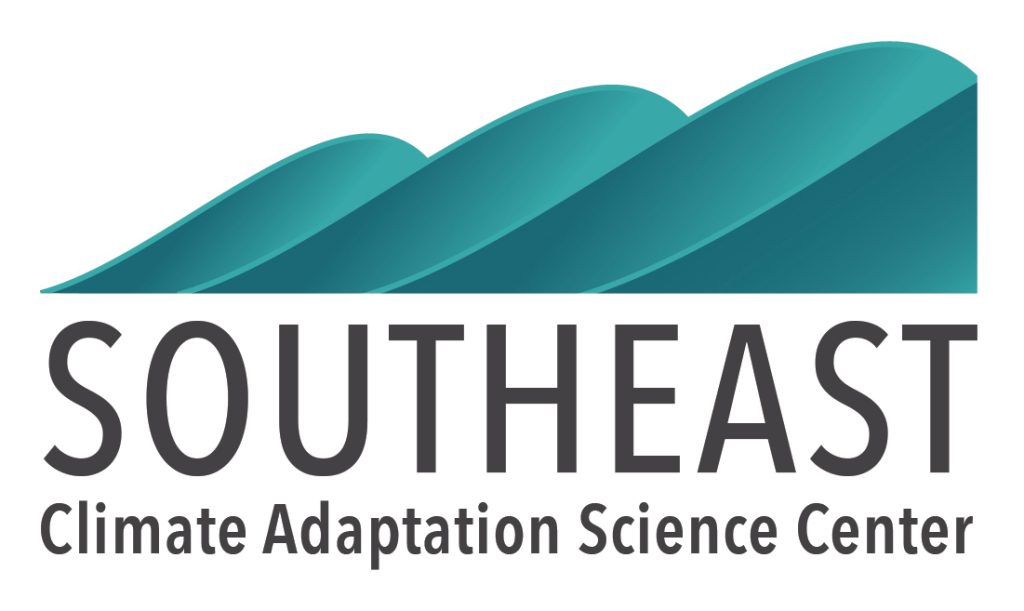February 2019 Newsletter

February 2019 Newsletter
Welcome to the Southeast Climate Adaptation Science Center’s February 2019 Newsletter.
In this newsletter you will find:
SE CASC News
Resources
Notable Publications
Tribal News
Regional Partner News
Webinars
Upcoming Events
Opportunities
For news and upcoming events related to the Southeast Climate Adaptation Science Center, subscribe to our monthly newsletter.
[divider]

Southeast Climate Adaptation Science Center News
SE CASC has some new faces. We’re pleased to introduce two new members of our communications team, Kyla Bloyer, Science Communications Specialist, and Ashlyn Shore, Science Communications Intern. Learn more about them at their linked staff profiles. We also have several new SE CASC Faculty Affiliates.
The SE CASC, together with several other NC State departments and colleges, is organizing a range of seminars, lectures, and events related to sea level rise this Spring. The first in the Global Change Seminar Series, held on Feb. 7, covered the science behind sea level rise and current conditions, future projections, and impacts in North Carolina; a summary and recording of the panel discussion will be posted on our website soon. The second Global Change Seminar, Human Impacts of Sea Level Rise, will be on March 28, 3:30 pm ET. The seminar is being held in conjunction with RISING NC Exhibit Grand Opening & Reception. A Student Showcase poster session will be a part of the event. Learn more here.
SE CASC Researcher, Jennifer Costanza and SE CASC Research Ecologist, Adam Terando published a paper in Current Landscape Ecology Reports, Landscape Connectivity Planning for Adaptation to Future Climate and Land-Use Change. They argue that successful promotion of connectivity as a means to adapt to climate change (CC) and land use change (LUC) will depend on (1) the velocity of CC, (2) the velocity of LUC, and (3) the degree of existing landscape fragmentation. They present a new conceptual framework to assist in identifying connectivity networks given these three factors.
SE CASC Researcher, Jaime Collazo and SE CASC Research Ecologist, Adam Terando were co-authors on an article in Ecology and Evolution, Partitioning global change: Assessing the relative importance of changes in climate and land cover for changes in avian distribution. The team used dynamic occupancy modeling to analyze the processes that influence avian species distribution, focusing on relation to climate and land cover change, in order to gain ecological insight into future changes in distribution. The paper derived from SE CASC supported project, Southeast Regional Assessment Project (SERAP): Assessing Global Change Impacts on Natural and Human Systems in the Southeast.
Faculty Affiliate, David Eggleston is co-author on a new publication in PLoS ONE, Integrating ecosystem services considerations within a GIS-based habitat suitability index for oyster restoration. Read the NC State news post.
See other SE CASC-supported publications in our Journals and Articles database.
Several of our Global Change Fellows are featured in recent Research Highlights. Learn more about them.
Latest from Conservation Corridor: Resources for connectivity and climate change.

Resources
FEATURED RESOURCE
Florida Adaptation Planning Guidebook
This guidebook is a product of the Community Resiliency Initiative directed by the Florida Department of Environmental Protection and the Florida Department of Economic Opportunity as part of the Florida Coastal Management Plan. The 185-page manual was created to support local Florida communities in implementing adaptation strategies to manage the effects of sea level rise. While other cities may not experience sea level rise in the same way that Florida communities will, the guidebook was designed to be applied in various contexts of adaptation methods, therefore making it relevant to a broader audience of resource management professionals. Learn more.
Climate Change in the American Mind: December 2018. This report analyzes American’s increasing awareness and concern about global warming and its associated risks. The results derive from a national survey conducted by the Yale Program on Climate Change Communication and the George Mason University Center for Climate Change Communication. Learn more.
Latest Sea Surface Temperature. Satellites measurements, combined with data from ships and buoys, can be merged into a computer program that determines the sea surface temperature (SST) in areas across the globe. NOAA has visually represented this information on their website, last updated on January 26, 2019. Learn more.
Climate vs Weather | Global Weirding. Watch as SE CASC researcher, Katherine Hayhoe, explains temperature variability in the face of climate change. View the newest episode or the Global Weirding Youtube channel.
Southeast Florida Regional Climate Change Compact. This compact symbolizes the cooperation of lawmakers in southern Florida to address and agree to take action toward climate resilience. This initiative has expanded beyond their regional agreement in a program called RCAP 2.0, offering a framework for other governments to implement climate change adaptation and mitigation strategies throughout their regions. Learn more.
Learning From Loss: Reflections on eroding coastal archaeology. A team of experts from the U.S. and Scotland traveled to the islands of Orkney and Sutherland to view the effects that coastal erosion has had on the area’s cultural heritage sites and discuss possible adaptation options. Watch here.
Literature Review: Climate Change Vulnerability Assessment, Risk Assessment, and Adaptation Approaches. Provided for the U.S. Department of Transportation’s Federal Highway Administration, this literature review explores three approaches that transportation officials may use to effectively prepare for climate events. These strategies include vulnerability assessments, risk assessments, and adaptation assessments. Learn more.
State of the Climate in 2017. Prepared as an addition to the Bulletin of the American Meteorological Society, the State of the Climate in 2017 provides a comprehensive update on global climate indicators and a detailed trajectory of various components of the climate system. Read the report. In addition, the World Meteorological Organization has released a Statement on the state of the global climate in 2017.
In the Media
Gone in a Generation. The Washington Post
Why people in the US south stay put in the face of climate change. The Guardian
Brace for the Polar Vortex; It May Be Visiting More Often. NY Times Climate and Environment
National climate change report: Plagues of insects and fires for Southern Appalachian forests?. Citizen Times
Guest post: Observations and models agree that the oceans are warming faster. Carbon Brief
LISTEN: Visiting climate migrants in New Bern, North Carolina. The Daily Climate
What Is The National Climate Assessment And Where Did It Come From?. Forbes

Notable Publications
Spatial and temporal changes in the frequency and magnitude of intense precipitation events in the southeastern United States. Researchers analyzed intense precipitation events (IPE) in the southeastern US from 1950 to 2016 on temporal, spatial, and synoptic scales. They used a spatial synoptic classification to determine what types of surface weather are related to IPEs and explored various surface forcing mechanisms to reveal the surface synoptic conditions responsible for IPEs. They concluded that the frequency and intensity of IPEs increased annually in the Southeast, specifically in the fall. Additionally, researchers determined that tropical events, stationary fronts, and concentric low-pressure systems are the most common surface forcing mechanisms related to IPEs. Link to article.
Living shorelines enhanced the resilience of saltmarshes to Hurricane Matthew (2016). This study compared rock sill living shorelines to naturally occurring marshes and hardened shorelines (bulkheads) in North Carolina from 2015 to 2017. Specifically, researchers investigated changes in surface elevation, Spartina alterniflora stem density, and structural damage. In the midst of this study period, Hurricane Matthew brought severe flooding, winds, and storm surge to the coast of North Carolina, placing additional pressures on these coastal barriers. It was determined that the living shorelines were more resilient than bulkheads and natural marshes during the hurricane. Additionally, the living shoreline’s elevation remained stable over the two year study period compared to the hardened shorelines that required repairs. Overall, this research suggests that living shorelines increase coastal resilience and provide greater protection to coastal ecosystems. Link to article.
Gulf of Mexico estuarine blue carbon stock, extent and flux: Mangroves, marshes, and seagrasses: A North American hotspot. The Gulf of Mexico (GoM) holds a large reserve of North American blue carbon stock in mangroves, salt marshes, and seagrass. Until now, there has not been an accurate assessment of the amount of blue carbon that resides in the Gulf. This paper gathered published data from a variety of authors to determine a more accurate measurement of the GoM’s blue carbon storage. Researchers concluded that the GoM holds three times as much blue carbon than the Atlantic coastline. Link to article.
Sympatry or syntopy? Investigating drivers of distribution and co‐occurrence for two imperiled sea turtle species in Gulf of Mexico neritic waters. This study used satellite tracking and modeled behavioral modes to investigate the spatial ecology of two sea turtle species: Kemp’s ridleys (Lepidochelys kempii) and loggerheads (Caretta caretta). 127 turtles were tracked from 1989 to 2013 to determine individual home ranges, foraging areas, and extent of co-occurrence. It was determined that co-occurrence areas were small in comparison to the species’ distributions and all explored habitat variables were different for both species. While the two species compete for food resources, their foraging interactions were rare, suggesting that Kemp’s ridleys and loggerheads are sympatric, but not syntopic. Link to article.
Twentieth century redistribution in climatic drivers of global tree growth. 2710 tree-ring sites were assessed to determine how boreal and temperate areas responded to temperature, precipitation, atmospheric water demand, and drought between the periods of 1930 to 1960 CE and 1960 to 1990 CE. Globally, tree growth was limited by atmospheric water availability that occurred with mild warming throughout the 20th century. It is projected that a continuously warming climate in the 21st century will lead to a redistribution of growth response driven by temperature gradients. Link to article.

Tribal News
2019 National Tribal Forum on Air Quality (NTFAQ). The NTF provides environmental professionals from tribes, EPA, and other organizations an opportunity to meet and discuss current policies, regulatory initiatives, and technical topics in air quality. The NTF is a cooperative endeavor co-sponsored by The Institute for Tribal Environmental Professionals (ITEP) and the National Tribal Air Association (NTAA), made possible by funding from US EPA and other generous sponsors. The NTF will take place on May 6-9, 2019 at the Pechanga Resort Casino in Temecula, California. Learn more.
The Institute for Tribal Environmental Professionals’ (ITEP’s) Tribes and Climate Change Calendar includes conferences, trainings, webinars and other events related to tribes and climate change. Click here for ITEP’s new Tribal Environmental Management and Planning Online Courses. Click here for ITEP’s other trainings and events. Click here to explore ITEP’s educational video recordings.
The Affiliated Tribes of Northwest Indians Tribal Climate Camp (TCC) has opened registration for this year’s camp. TCC is a collaboration among the Affiliated Tribes of Northwest Indians (ATNI), Institute for Tribal Government (ITG) United South and Eastern Tribes (USET), and the Department of the Interior’s (USDI) Northwest Climate Science Center (NW CSC) and Bureau of Indian Affairs (BIA) to support teams of tribal leaders, climate change coordinators, planners, and program managers to build skills, gather information, and develop tribal policy needed to address climate change impacts. The event will take place from June 16-21, 2019. Register here.

Regional Partner News
Association of Fish and Wildlife Agencies: Adaptation in Action Issue #3
Southeast Regional Climate Center: January 2019 Southeast Region Monthly Climate Report
National Audubon Society: Announces Comprehensive Gulf Restoration Plan
South Atlantic Landscape Conservation Cooperative: Better regional depiction of military priority areas in development.
Climate Adaptation Knowledge Exchange: New resource, Southeast Regional Climate Hub Assessment of Climate Change Vulnerability and Adaptation and Mitigation Strategies.

Webinars
Find more webinar information in our calendar.
Feb 14 | 1PM – 2PM | Case Studies in Climate Adaptation in Marine Protected Areas
Feb 14 | 2PM – 3PM | Shoreline Mapping Data and Products
Feb 14 | 3PM – 4PM | New technology for old problems: Exploring the use of eDNA in the reserve system
Feb 19 | 10AM – 11AM | Earth Observations for Indigenous-Led Land Management
Feb 19 | 12PM – 1PM | The Price of Extreme Weather Uncertainty: Evidence from Hurricanes
Feb 19 | 3PM – 4PM | Observaciones de la Tierra para su Gestión a Cargo de Pueblos Indígenas
Feb 21 | 10AM – 11AM | Developing regional GIS-based coastal resilience assessments
Feb 21 | 12PM – 1PM | Innovative Engagement Strategies
Feb 21 | 2PM – 3PM | Assessing decision-risk in species range maps and distribution models for use in conservation and management
Feb 26 | 12PM – 1PM | Fighting fake science: Barriers and solutions
Feb 26 | 12PM – 1PM | From Science to Solutions: The State of the Carbon Cycle
Mar 5 | 12PM – 1PM | Rising Carbon Dioxide’s effects on Land and Ocean

Upcoming Events
Find more upcoming events in our calendar.
March 5 | Extreme weather events: How to protect native fish and wildlife in a changing urban environment | Denver, CO
Sponsored by the USDA Forest Service, Texas Parks & Wildlife Department, National Wildlife Federation, and the Association of Fish and Wildlife Agencies, this half-day workshop will explore critical issues related to climate change and their solutions. Attendees will learn from current leaders in the field about creative adaptation strategies to effectively prepare for the impacts of climate change. This session will be held at the 84th North American Wildlife & Natural Resources Conference in Denver, Colorado.
April 3-5 | Beyond Despair: Theory and Practice in Environmental Humanities | Research Triangle Park, NC
This unique three-day summit of scholars and experts from across the country features a dynamic intersection between discussion, presentations, and exhibitions, grounded in practical site excursions. The summit is being convened by Robert D. Newman, founder of the first Environmental Humanities graduate program in the U.S., and current director of the National Humanities Center. Confirmed presenters include scholars, teachers, students, scientists, community leaders, activists, and artists in an effort to build bridges between the global and the local. Click here for more information.
April 23-25 | 2019 National Adaptation Forum | Madison, WI
Attendees will learn how to make their work climate-informed, share what they learned with others, and develop a stronger network of like-minded peers. Those who attend will benefit from exposure to all aspects of the field, professional development, and information sharing through an innovative and comprehensive program featuring plenary sessions, symposia, working groups, training sessions, exhibit booths, poster sessions, and networking events. Register here.
At NC State
Feb 18 | Population-density mediated resource partitioning by red-cockaded woodpeckers | 1216 Jordan Hall
Feb 25 | Skunks, Satyrs, and Solar: How the World’s Largest Land Trust Conserves NC Wildlife | 1216 Jordan Hall
March 5 | Evolution in a Changing World: How Species Interactions Influence Adaptation to Global Change | Stephens Room of Thomas Hall
Opportunities
Student Announcements
North Carolina Sea Grant is accepting applications for the John A. Knauss Marine Policy Fellowship Program. Current graduate students with an interest in coastal, marine, and Great Lakes resources and the policies that affect those resources are encouraged to apply. The application deadline is February 22, 2019. More information.
Hiring Announcements
The National Center for Ecological Analysis and Synthesis (NCEAS) at the University of California, Santa Barbara is seeking a Deputy Director. The successful candidate will work with the NCEAS Executive Director, the Directors of NCEAS initiatives, and other NCEAS staff and scientists to support and grow a diverse portfolio of research, data science and learning initiatives. More details.
The Center for Climate Systems Research in the Earth Institute at Columbia University invites applicants for a Post-Doctoral Research Scientist position focused on the creation of a Symbiotic Agent-Based Network Platform for analysis of food security and human migration. Applications are due by March 1 unless the position is filled prior to that date. Apply here.
The National Center for Ecological Analysis and Synthesis (NCEAS) is seeking a top candidate for a newly-created Director’s Postdoc. The successful candidate will pursue research of her/his own interest in any domain of environmental science using analytical or synthesis approaches. The ideal candidate will have excellent quantitative and modeling skills, an interest and track record in publishing in top science journals, demonstrated commitment to open science principles and practice, interest in engaging with the diverse community at NCEAS, and experience communicating science in policy, public and media outlets. For full consideration, apply by March 1. Apply here.
The University Center for Human Values and the Princeton Environmental Institute at Princeton University invite applications for a postdoctoral research associate or more senior position working at the intersection of ethics and global change to contribute to the Climate Futures Initiative in Science, Values, and Policy. More details.
The Science for Nature and People Partnership (SNAPP) seeks a postdoctoral fellow to collaborate on a new, two-year project titled “Landscape-scale forest assessments to support zero-deforestation supply chains.” This project is designed to empower the participation of small producers in zero-deforestation supply chains and support companies and governments to make conservation decisions based on landscape-scale connectivity. Applications are due by March 31. Apply here.
Miscellaneous
The Association for Preservation Technology (APT) is soliciting abstracts for their annual conference, which this year is in Miami in November. For this conference, APT is choosing to focus on climate change, sustainability, and the social impacts of heritage work. Abstract submissions are due by March 4. More information.
- Categories:


